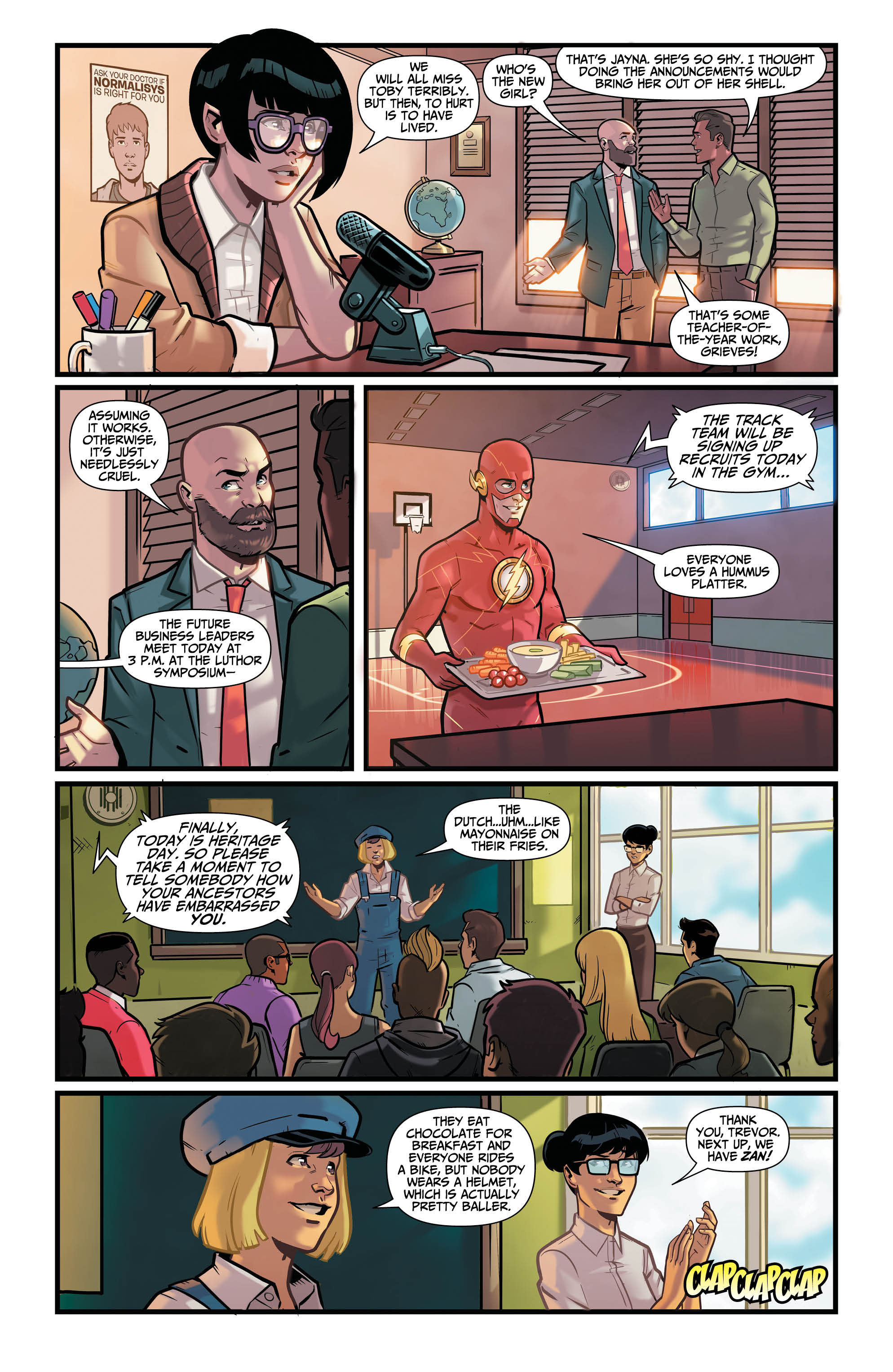[Editor’s Note: This review may contain spoilers]
Writer: Mark Russell
Artist: Stephen Byrne
Letters: Dave Sharpe
Summary
Zan and Jayna are like any typical high school student: they are stressed, trying to fit in and find their place, and struggling to juggle school work, social pressures, and a part-time job. The only differences are that Zan and Jayna are stressed because they were asked to leave their home planet, trying to fit in on Earth for the first time, and their part-time job involves being superheroes and working monitor duty at the Hall of Justice!
Positives
What would it feel like to live in Earth’s complicated, diverse, and slightly fucked-up society after coming a from a utopian planet free of poverty and social conflict with your entire future ahead of you? That’s the question Jayna and Zan are faced with in Wonder Twins #1, and it is a refreshing one. Youth-centric comics often focus on what young ones have to learn as they come into their own, ignoring the perspectives and ideas they can teach others. Russell delivers this in spades.
Wonder Twins #1 works on a number of levels. For young readers, the Wonder Twins are relatable characters even in the world of superheroes. Jayna is a character who is extremely smart and can contribute meaningfully to adult conversations, but is often afraid to speak up. Adults at school and at home are forcing Jayna to partake in activities she isn’t too excited about because they think they know what’s best for her, even though they’ve never asked. That’s something every young adult can relate to. Jayna just wants a little time to herself so she can figure out all of this new information for herself, but no high school student gets a warning when big changes are coming. She’s extremely perceptive of those around her and wants the freedom to make an impact. She has a great conversation with Wonder Woman after an unfortunate mishap Zan had at school, and she showed genuine concern for her brother. She wanted to fix things for him and seeing that was very touching. It is going to be very exciting to see how Jayna deals with her own awkwardness and other perceptions of herself.

Zan, on the other hand, is quite the opposite. He’s a brash character who rushes into opportunity with confidence and sometimes without a plan. That is its own set of issues and is equally relatable. Zan is unwaveringly proud of who he is because he’s never been given a reason not to be, and that is a great thing. Even in high school he is unashamed to talk about something as taboo as sex in an educational, respectful, and celebratory, which is important. Sometimes he’s says the wrong thing, but that never deflates him because he has such a confident and relaxed personality. He cares a lot more about his image, but not in a way that necessarily compromises who he is. When Zan finds his unique way of contributing to the hockey team, it is a laugh-out-loud moment. Zan is a refreshing level of bold without being an asshole, and it is heartbreaking when he has to deal with his first big embarrassment but equally touching when he’s taught to move forward.
On another level, Wonder Twins #1 is a satire that pokes fun at the way our society treats young individuals while serving as a great reminder that all adults, even superheros, were once children. It is very striking to see the Trinity have a conversation that essentially judges Jayna and Zan on their powers before giving them a chance similar to how many comic fans use powers as a basis for ranking, comparing, and arguing about superheroes. Hearing Superman use the word “changeling” to describe the Wonder Twins, which sounds disrespectful even before its addressed and Wonder Woman exclaiming that she’s underwhelmed before meeting them was a great way to show that even the Trinity has flaws without destroying our idols. In many ways, Superman’s handling of the situation is very immature in the way that he’s figuring things out as he goes. There are plenty of moments where heroes make a fool out of themselves in ways that are silly and don’t destroy their character but rather humanize them. Just like Jayna, Zan, you, or me, Superman and Batman had some rough moments in high school too, and as Superman says, “High school is a buffet line of humiliation, Zan. Everybody gets a plate.” It not impossible to be a teenager, and everyone has to grow up, but its great to see a reminder that adults were kids too.
One of my favorite parts of the comic is the little things such as character quirks, fun facial expressions, and most importantly, the posters in the background. There are of them sprinkled throughout the issue advertising things like the “normalysis” treatment, the school play “Delusions of Grandeur,” and the fact that the school’s logo promotes a pack mentality and peer pressure by depicting wolves coming out of a box resembling a pack of cigarettes. Byrne does a great job incorporating things like that into the background. High school can be a powerful developer for group-think mentalities, and Russell does a great job of warning against that.

Negatives
The only really minor negative I could bring up is that the colors were a little flat for me. I didn’t find the style very exciting, but even then it fits the issue and tone well due to its very young, fresh look. Overall, Wonder Twins #1 is a fantastic addition comics that sets out what it’s trying to do perfectly.
Verdict
Wonder Twins #1 evaluates youth and its relationship to being a hero in ways other series do not by recognizing that young characters have just as much to teach their peers and elders as they have to learn.
